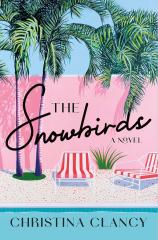Reading Group Guide
Discussion Questions
The Snowbirds

1. Discuss the structure of the novel, specifically its alternate timelines. How did this reading experience affect your perspective on each character? Did your opinion of whether Grant was lost, or that he had left Kim, change over the course of the narrative?
2. Compare and contrast Kim’s and Grant’s respective mindset and approaches towards aging, retirement and being called snowbirds.
3. “It was both sexy and disconcerting to discover that he had a deep well of knowledge he’d never shared with me before. What else hadn’t he told me? What else didn’t I know?” (page 78) Have you ever felt similarly about someone you felt close to? Do you think it’s possible to ever fully know another person, or yourself?
4. “You each have individual healing work to do before you can come together.” (page 192) What do you think the novel suggests about the importance of self-care as a way of nurturing your long-term relationships? How can outsiders’ perspectives, such as Cassie’s in this instance, provide clarity at times?
5. For most of the novel, Kim doesn’t want to "need” Grant. And Grant loves hiking because it requires self-sufficiency. How do they each evolve around this topic over the course of the novel? In your mind, is a healthy relationship defined by how independent each person is or how mutually dependent they are on each other?
6. “We outsourced our emotional needs to our exes, never fully showing the messiest parts of ourselves to each other.” (page 97) Discuss Kim’s relationship with Basil and Grant’s with Sasha. What are the impacts of each ex’s presence in their lives as a couple? In what ways do these past relationships fuel and restrict Kim and Grant’s present relationship?
7. At times, Kim and Grant both feel their parents’ past judgments and harsh words creep into their inner dialogue. How does this affect the way they operate in the world and the way they see themselves, even as adults? What does this say about the lasting impressions of our formative years?
8. “Hiking is teaching me how not to think. I’m learning how to simply exist in the world with the wind between my ears, not a thought in my head.” (page 203) Does hiking change how Grant experiences both the external world and his own internal life? Is there an activity that has this kind of effect on you?
9. Consider the different types of people Kim and Grant encounter in Palm Springs: a widow, a gigolo, a gay couple, an elderly husband and wife, a bitter ex, a new age healer. How do they inform the way that Kim and Grant see each other? If no relationship exists in a vacuum, what sort of impact do other people have on your relationships?
10. How does the concept of “home” change for Kim and Grant over the course of the novel? After reading THE SNOWBIRDS, what do you think defines a “home”?
11. Some people describe getting lost as a liberating experience that opens you up to being in the moment and having new experiences, while the thought of becoming disoriented fills others with fear and confusion. How do you handle situations where you don’t know where you are --- in a place, a relationship, and in life? Do we have to be lost to be found?
12. Kim says she hates winter, but Grant doesn’t mind the cold. Since weather is inextricably tied to place, what happens when couples can’t agree on where to live? Is weather a trivial or legitimate reason for couples to have issues?
13. If Kim and Grant hadn’t gone to Palm Springs, do you think they would have made it as a couple? Do relationships benefit from a change of scenery and habits?
14. Near the beginning of the novel, Kim wonders if it was too late to start over. Later, Melody tells Kim that she’s experiencing a renaissance. Are there certain junctures in our lives when we can experience a revival or rebirth? If so, how can we be open to them?
The Snowbirds
- Publication Date: February 4, 2025
- Genres: Fiction, Women's Fiction
- Hardcover: 304 pages
- Publisher: St. Martin's Press
- ISBN-10: 1250284953
- ISBN-13: 9781250284952







